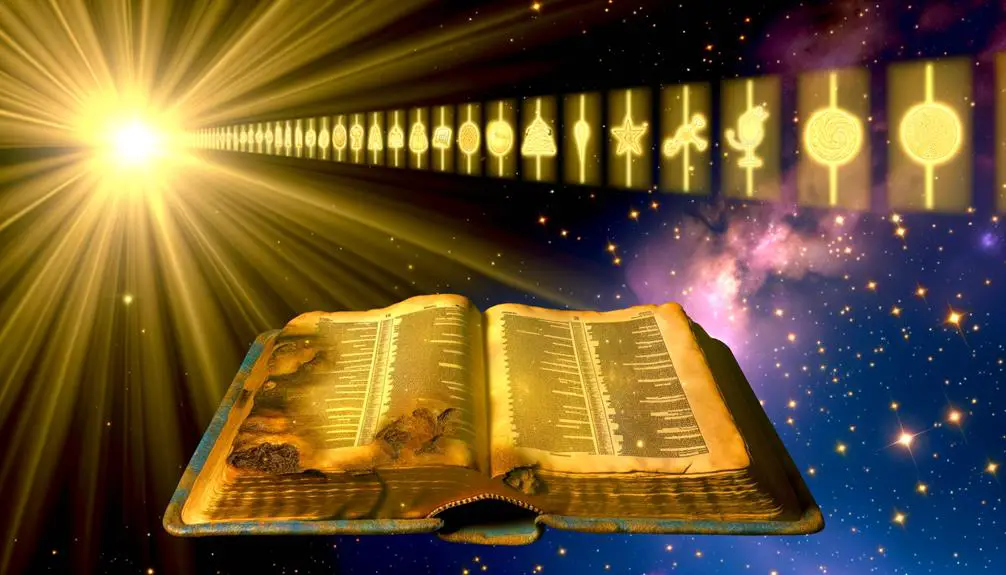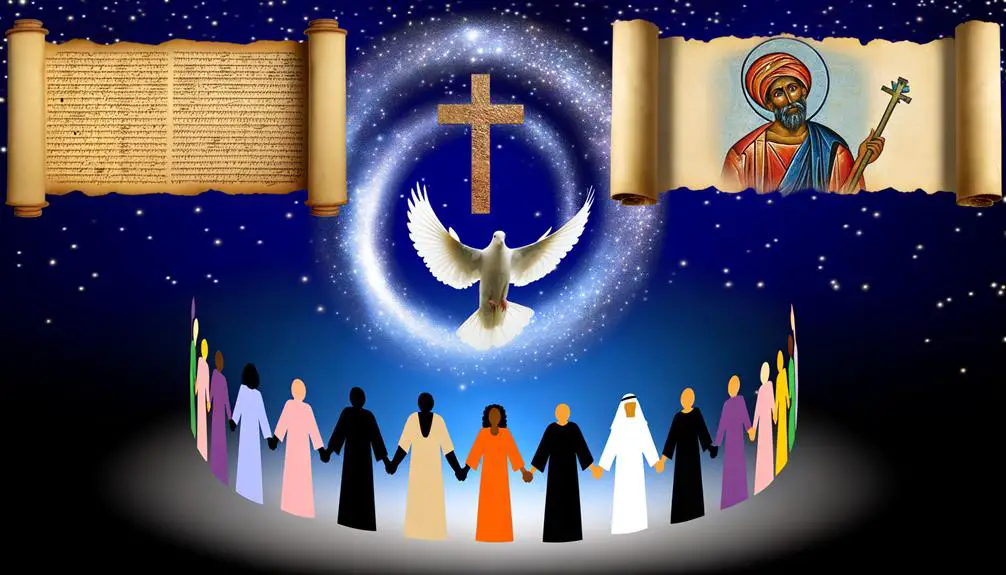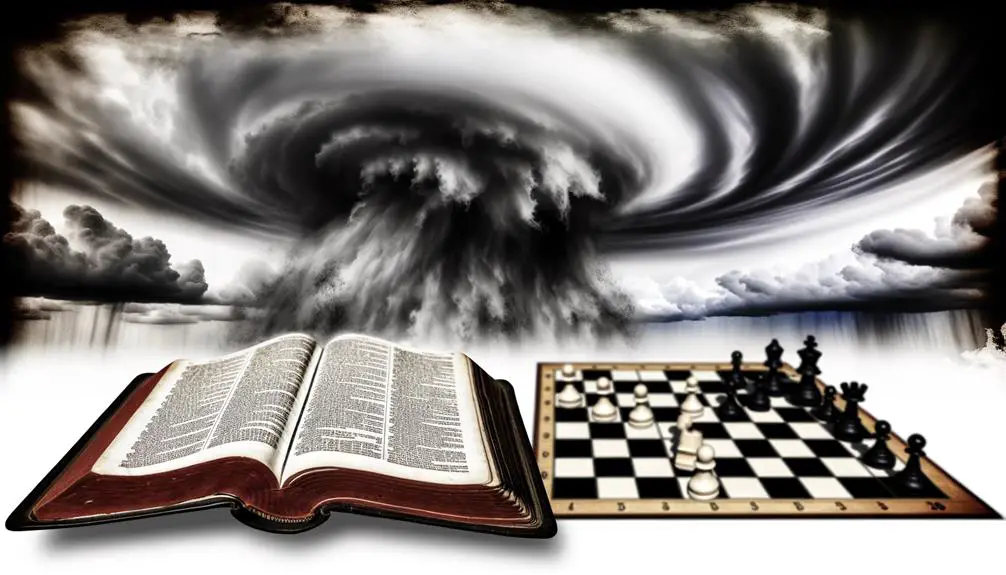Explore how the Bible's complex view on foreknowledge intertwines with free will, divine omniscience, and destiny, opening new realms of spiritual understanding.

Foreknowledge Definition in the Bible
While you might think the concept of foreknowledge in the Bible is too complex or esoteric to grasp fully, you'll find that a deeper exploration can offer clarity and insight into this profound topic.
The Bible's depiction of foreknowledge isn't just about God's ability to see the future; it's intertwined with themes of free will, predestination, and the nature of divine omniscience.
As you embark on this journey, consider how understanding foreknowledge could reshape your perspective on fate, divine intervention, and personal responsibility.
The implications for believers are vast and thought-provoking, providing ample ground for further exploration and discussion.
Key Takeaways
- Foreknowledge in the Bible refers to God's omniscient ability to know future events before they occur.
- It is rooted in scriptural evidences, showcasing divine omniscience across both the Old and New Testaments.
- Theological perspectives vary, with views like Classical Theism, Open Theism, and Molinism discussing its implications on free will.
- Understanding foreknowledge enriches Christian theology, highlighting the coexistence of divine knowledge and human responsibility.
Understanding Foreknowledge

In exploring the concept of foreknowledge in the Bible, it's crucial to recognize that this divine attribute signifies God's omniscient ability to know events before they occur, reflecting His sovereign and timeless nature. This understanding is foundational in appreciating the depth of divine timing and the perceived limits of omniscience from a human perspective.
You might question how divine timing intersects with God's foreknowledge. It's essential to understand that God's timing isn't arbitrary but is deeply intertwined with His omniscience. He knows not just what'll happen, but when it's best for events to unfold, from the grand scale of history to the minutiae of individual lives. This precision in divine timing underscores His perfect foreknowledge and sovereign control over creation.
At the same time, discussions about the limits of God's omniscience often arise. It's a complex topic that challenges our understanding. However, it's important to clarify that these perceived limits don't suggest a deficiency in God's knowledge but rather point to the mystery of His nature as understood by finite beings. His foreknowledge is complete and exhaustive; there's nothing outside His awareness. Yet, He allows for human free will within His sovereign plan—a paradox that has puzzled theologians and believers alike.
Analyzing foreknowledge in this scholarly, faith-informed manner helps you appreciate the balance God maintains between His omniscience and the free will He grants humanity. It's a testament to the complexity and depth of God's nature, inviting deeper reflection on His sovereign and timeless existence.
Scriptural Foundations

Frequently, the Bible presents clear instances of God's foreknowledge, demonstrating His divine insight into future events through scriptural narratives and prophetic declarations. This divine omniscience, the complete and infinite knowledge of all things past, present, and future, is a cornerstone of biblical theology, painting a picture of a God who's not bounded by time or space.
You'll find that the Old Testament is replete with examples of prophetic revelations, where God's foreknowledge is displayed through the prophets. For instance, the detailed prophecies about the coming of the Messiah in Isaiah offer a striking testament to God's ability to foretell events far in the future with precision. These weren't vague predictions but specific details about the life, ministry, and death of Jesus Christ, showcasing divine foreknowledge in action.
Moreover, in the New Testament, Jesus Himself demonstrates foreknowledge of events to come, including His own death and resurrection, and the betrayal by one of His disciples. These instances aren't just narrative elements; they're profound affirmations of the claim to divine knowledge and authority.
Analyzing these scriptural foundations, it's evident that the concept of God's foreknowledge isn't a peripheral doctrine but is central to the biblical understanding of God's nature. It's a testament to the depth of God's engagement with creation, affirming that nothing is beyond His sight or understanding. The Bible's presentation of divine omniscience through prophetic revelations not only underscores God's supreme authority but also offers believers a foundation for trust in God's promises for the future.
Theological Perspectives
Having established the scriptural basis of God's foreknowledge, we now turn our attention to various theological perspectives that seek to understand this divine attribute more deeply. The exploration of divine omniscience and its implications on human responsibility has long intrigued theologians, leading to a range of interpretations within the Christian tradition.
Perspective |
Key Consideration |
|---|---|
Classical Theism |
Emphasizes God's timeless knowledge of all events, underscoring divine omniscience. |
Open Theism |
Suggests God's foreknowledge doesn't encompass free will choices, emphasizing human responsibility. |
Molinism |
Proposes God's knowledge includes all potential scenarios, balancing divine omniscience and human freedom. |
Classical theism holds that God's knowledge is not bound by time, suggesting that divine foreknowledge and human action can coexist without infringing on human responsibility. This view implies a God who is fully aware of the future, yet allows for human freedom within this omniscient framework.
Open theism, in contrast, challenges the traditional understanding of omniscience by proposing that God knows everything that can be known, but the future free will choices of individuals remain open and undetermined. This perspective emphasizes human responsibility, suggesting that our choices genuinely influence the course of history.
Molinism attempts to bridge these perspectives by introducing the concept of middle knowledge, where God knows not only what will happen but what could happen under any given set of circumstances. This nuanced approach maintains divine omniscience while upholding the significance of human responsibility and choice.
Each theological perspective offers a distinct lens through which to view the intricate relationship between divine foreknowledge and human freedom, inviting believers to engage deeply with the mystery of divine omniscience and human responsibility.
Foreknowledge and Free Will

Exploring the nuanced interplay between divine foreknowledge and human free will reveals a complex dialogue essential for understanding theological doctrines within Christianity. The concept of divine omniscience—that God knows everything that will happen before it occurs—raises intriguing questions about the extent of human responsibility and the nature of free will. How can humans truly have free will if their actions are already known to God?
To unpack this, consider the following:
- Divine omniscience doesn't necessarily dictate human action; rather, it's an eternal observation of the choices humans freely make.
- The Bible presents instances where God's foreknowledge and human free will coexist, suggesting a divine framework that accommodates both.
- Theological discussions often posit that God's foreknowledge of future events isn't a cause of those events, thereby preserving human agency.
- Understanding the relationship between God's foreknowledge and human free will can deepen one's appreciation for the mystery and majesty of divine wisdom.
- Scholars and theologians debate the implications of this relationship, yet many agree that it underscores the importance of human choices within God's sovereign plan.
This scholarly exploration into the relationship between divine omniscience and human responsibility reveals an intricate balance. It's a testament to the depth and richness of Christian theology, inviting believers to reflect on the profound implications of their faith.
As you delve deeper into this topic, remember that the dialogue between divine foreknowledge and free will isn't about diminishing human agency but about enriching our understanding of divine-human interaction within the biblical narrative.
Implications for Believers

Reflecting on the dynamic interplay between divine foreknowledge and human free will leads us to consider its profound implications for believers' lives and decision-making processes. Understanding that God possesses foreknowledge of all events doesn't negate our responsibility to make choices. Instead, it invites you to ponder the weight of your moral responsibility in light of this divine attribute. It's a nuanced perspective that underscores the significance of living in alignment with God's will, recognizing that each decision you make is under the purview of divine timing.
This understanding demands a careful consideration of how you navigate life's choices. It's not merely about acknowledging God's omniscience but integrating this knowledge into how you approach ethical dilemmas and moral decisions. The recognition of God's foreknowledge should inspire a deeper commitment to seeking His guidance, trusting that He's aware of the outcome of every decision yet values your free will to choose.
Moreover, this insight into divine foreknowledge and human agency enhances your appreciation for the relationship between God's sovereignty and your personal freedom. It doesn't absolve you of the consequences of your actions but emphasizes the importance of aligning your choices with divine principles. Thus, you're called to a higher standard of moral responsibility, with the assurance that your steps are ordered within the framework of divine timing.
In essence, the knowledge of God's foreknowledge shouldn't paralyze you with fear but empower you with the confidence to make decisions that reflect your faith, knowing that you're co-navigating life's complexities with a God who's both all-knowing and infinitely wise.
Controversies and Debates

You encounter interpretive challenges when exploring foreknowledge in the Bible, particularly as they pertain to predestination versus free will. These debates have profound theological implications, shaping how you understand God's sovereignty and human agency.
As you navigate these discussions, it's crucial to engage with the texts critically and with an open heart, seeking wisdom and clarity.
Interpretive Challenges
In navigating the complexities of biblical interpretation, the topic of foreknowledge presents a myriad of interpretive challenges, sparking debates among scholars and believers alike. Understanding the nuances requires a deep dive into:
- The cultural context in which the scriptures were written
- Questions surrounding historical accuracy
- The original language's subtleties and how they translate into modern dialects
- The theological implications of God's foreknowledge on human agency
- The diversity of interpretations across different Christian denominations
Analyzing these factors is crucial for a comprehensive grasp of biblical foreknowledge. Each element sheds light on the multifaceted nature of divine omniscience, guiding you through the intricate maze of scriptural understanding, while always keeping in mind the balance between scholarly insight and faith-informed perspective.
Predestination Vs. Free Will
Amid the complexities of biblical interpretation, the debate over predestination versus free will stands as a pivotal issue, challenging scholars and believers to reconcile God's foreknowledge with human autonomy.
You're confronted with the tension between divine omniscience and human responsibility, navigating a theological landscape that's both intricate and deeply personal.
On one hand, predestination emphasizes God's sovereign control over all events, suggesting that your choices are part of a divine plan. On the other, free will asserts your ability to choose independently of God's foreknowledge, highlighting human responsibility.
This debate isn't just academic; it touches the core of faith, asking you to consider how divine knowledge and human freedom coexist. It's a quest for understanding that requires both humility and wisdom.
Theological Implications
Delving into the theological implications of predestination versus free will uncovers a spectrum of controversies and debates that have shaped Christian thought for centuries. These discussions aren't merely academic; they touch upon the heart of understanding divine attributes and our moral responsibility.
- How do divine foreknowledge and human freedom coexist?
- Can God's omniscience and omnipotence be reconciled with human autonomy?
- What is the impact of predestination on moral responsibility?
- How does the concept of election affect our understanding of God's love and justice?
- In what ways do different Christian traditions interpret the interplay between God's sovereignty and human choice?
This exploration challenges us to think deeply about the nature of God and our place in His creation, balancing scholarly inquiry with faith-informed wisdom.
Frequently Asked Questions
How Has the Concept of Foreknowledge Evolved in Different Biblical Translations Over the Centuries?
You've noticed how the idea of foreknowledge has morphed across various biblical translations through time. Translation consistency and manuscript variations play crucial roles in this evolution.
Scholars, keeping faith and analysis in harmony, delve into these texts, identifying shifts in interpretation. This scrutiny reveals how translations adapt, balancing ancient meanings with contemporary understanding.
Your exploration into this field illuminates the intricate dance between preserving original texts and embracing evolving linguistic landscapes.
Are There Any Non-Canonical Texts or Apocryphal Writings That Offer Unique Perspectives on Foreknowledge Absent in the Canonical Bible?
Diving into the sea of ancient texts, you'll discover unique pearls of wisdom. Non-canonical texts and apocryphal writings, such as those with Gnostic insights or Essene interpretations, offer fresh perspectives on foreknowledge.
These texts, often overlooked, provide a broader, more nuanced understanding of predestination and divine will. They invite you to explore beyond the canonical boundaries, enriching your faith-informed, scholarly quest with perspectives absent in the traditional Biblical canon.
In What Ways Have Different Cultures and Religions Outside of Christianity Interpreted or Integrated the Biblical Notion of Foreknowledge Into Their Own Spiritual or Philosophical Systems?
You'll find that different cultures and religions have woven the idea of foreknowledge into their beliefs in unique ways.
For instance, Islamic predestination holds that Allah has foreknowledge of all events, a belief that deeply influences Muslim faith and practice.
Similarly, Hinduism incorporates foreknowledge through the concept of karma, where past actions influence future outcomes, reflecting a nuanced understanding of fate and free will.
These interpretations offer a rich tapestry of spiritual insight.
How Do Modern Advancements in Science and Technology, Such as the Study of Time or Predictive Algorithms, Challenge or Complement Biblical Ideas of Foreknowledge?
You're navigating a world where quantum mechanics and artificial intelligence redefine boundaries. Modern science, with its study of time and predictive algorithms, either challenges or complements biblical foreknowledge.
Quantum mechanics unravels the fabric of reality, hinting at a universe beyond human understanding. Meanwhile, artificial intelligence forecasts trends with startling accuracy, echoing biblical prophecies.
Analyzing these parallels, you'll find a fascinating interplay between faith-informed insights and scientific advancements, enriching both perspectives.
Can the Concept of Foreknowledge in the Bible Be Reconciled With Contemporary Understandings of Mental Health, Especially in Relation to Destiny and Personal Agency?
You can reconcile contemporary mental health insights with biblical concepts by emphasizing mental resilience and agency empowerment. Understanding your mental health challenges as part of your journey can empower you to take active steps towards healing, aligning with the idea that foreknowledge doesn't negate personal agency.
This perspective fosters a faith-informed, analytical approach to destiny, suggesting that pre-knowledge and free will can coexist, enhancing personal growth and spiritual understanding.
Conclusion
In sum, the scriptural scaffolding supporting the concept of foreknowledge fuses faith's foundations with freedom's frontiers, forming a fascinating facet of theological thought.
As believers, you're beckoned to balance between divine determinism and human autonomy, a task both tantalizing and taxing. This theological tightrope threads through controversies and conversations, urging a deeper dive into doctrine.
Ultimately, understanding foreknowledge enriches your spiritual sojourn, steering you towards a more profound perception of providence and personal purpose in the panoramic play of existence.



Sign up